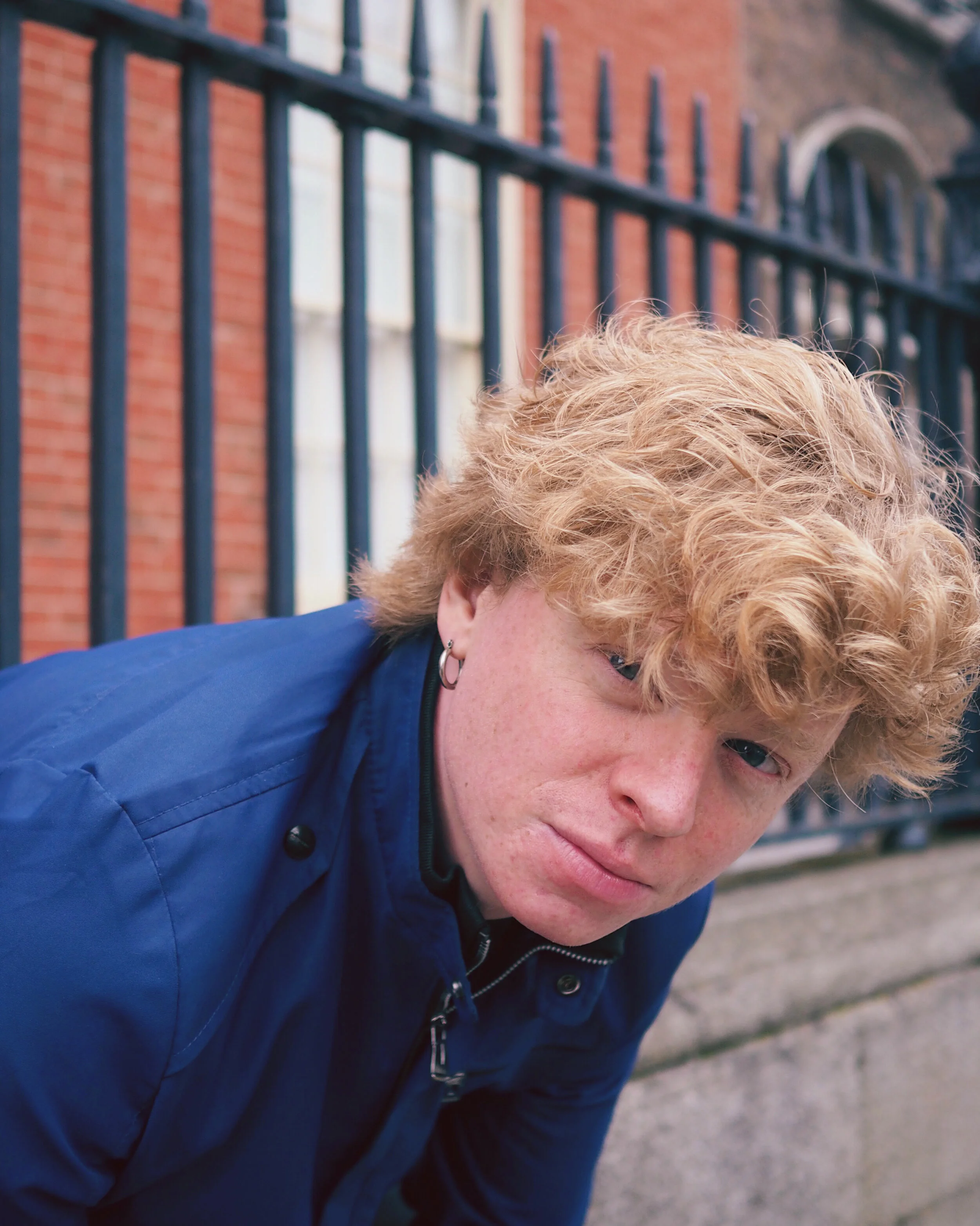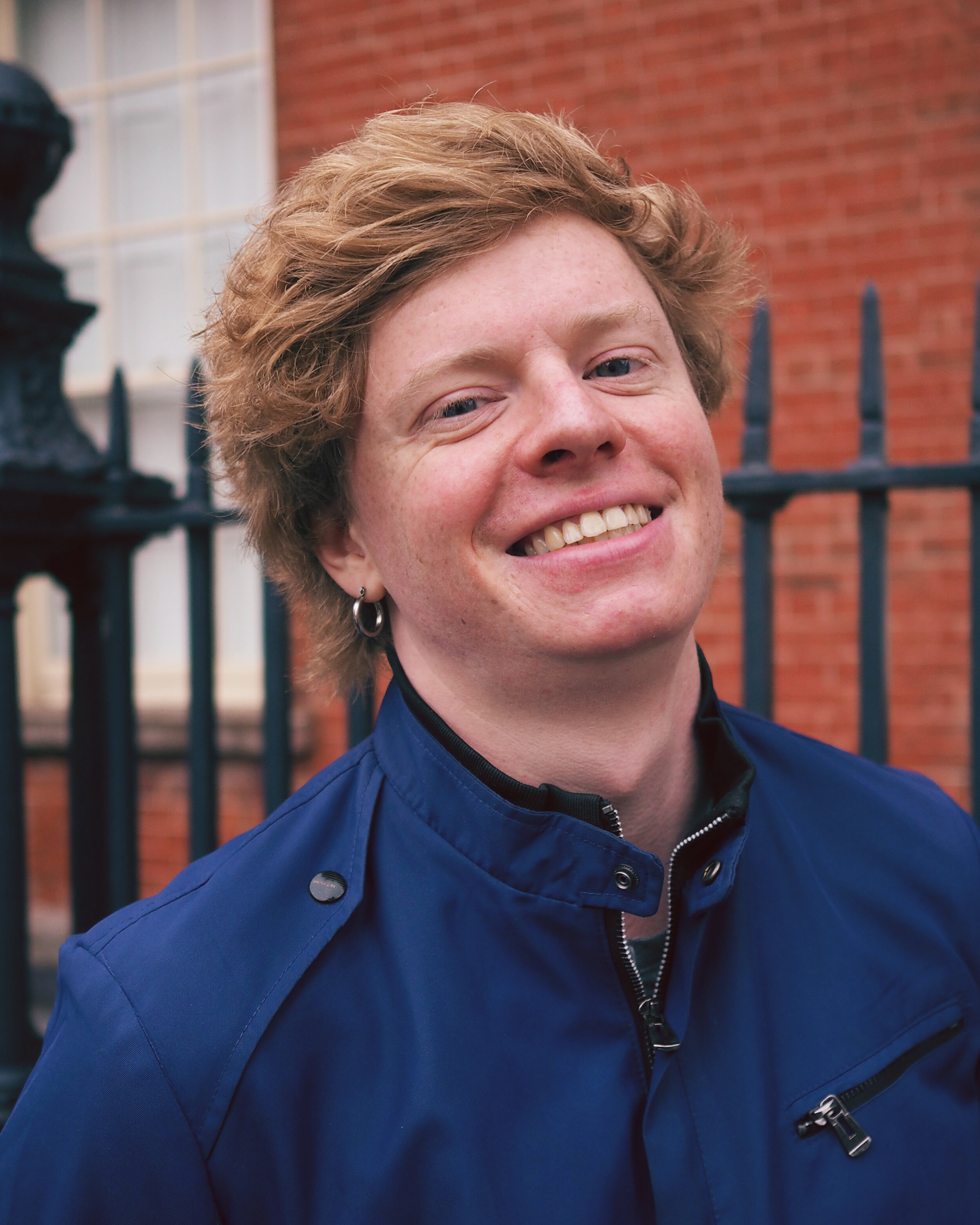Conor Anderson
Conor Anderson and I walk beneath the canopies of trees bordering St Stephen’s Green; dense and lush from the changeable weather of an Irish summer. The Saturday atmosphere of the place is kinetic, on what feels like the first occasion that the city has rediscovered its particular type of weekend buzz, last seen pre-pandemic. Conor’s innate disposition feels like an extension of this carefree and joyful ambience. Upbeat and cheerful, his is a manner at odds with the potency of his story.
Over four laps of the perimeter of the park, he generously recounts his negotiation of sexuality and sobriety, shame and stigma. Told with warmth and vulnerability, his story is one of self acceptance and self compassion. Conor is resilience embodied. Convinced of the value of sharing his experience, he does so with generosity; assured of the help and hope it might offer, particularly in his role as President of the Student Union at UCD. He is not wrong.
Born and raised in Seattle, Washington, Conor remembers his younger self, plainly put, as a weird little gay kid. Motoring through high school, unhappy and not particularly popular, he says, he was 18 when he found a friend who liked to drink, setting him on a path that he would maintain until he was 27. Soon after, college brought him to Los Angeles.
“I fell in love with the place: the club scene, the things you do around the club scene – drinking and otherwise.” Remaining firmly situated in the closet, he was an ostensibly straight boy; one who would accompany girl friends to gay clubs solely so they could dance and not be bothered – or so the pretence went. It was also during this period in Los Angeles that he was diagnosed with HIV.
Joking that he has just marked his ten year “AIDS-iversary”, Conor is quick to remind me of how different the landscape looked in 2010. It was before the advent of PrEP, and before the mainstreaming of U=U. Diagnosed at age 21, he was bereft. “I felt I had suddenly lost any romantic prospects forever, which is hard to deal with when you’re that age, closeted and also drinking really heavily. It did a number on me.”
The shell shock of his diagnosis manifested in “a mess” of a senior year in college: fighting with friends, drinking heavily and skipping classes. He still graduated with a decent grade, he remarks. By night, he would get blackout drunk at parties, tearfully revealing his sexuality and his HIV status, only to forget the following day that he had told anyone anything at all. “I didn’t get invited to a lot of parties at that point.”
Having struggled with personal avowal, insult followed injury when he finally drew the courage to tell four friends in confidence that he was HIV positive. That was before he departed for Germany for a summer research project. On his return, it transpired that they had shared his story, stripping him of his agency and denying him control of his own narrative. “That screwed me up. It shattered my sense of trust. I had a constant paranoia.”
Conor speaks about the layers of self shame and stigma he experienced in his early 20s with great fluency and ease today, certain back then that he would never disclose his status, living a sad, lonely, short and drunk life instead, as he puts it. He describes how, at one point, he had a pseudonymous blog on Tumblr, where he would write about HIV stigma, pretending to be a HIV negative person. “I was writing anonymously on the internet, as a positive person pretending to be negative, and standing up against stigma towards positive people. That’s where I was at.”
A sense of futurity and hope began to grow from taking to the internet; looking at dating sites for people living with HIV and informing himself. A sense of owning his status followed. Although Conor came out to his mother as HIV positive four years before he came out as gay, the support of his parents offered further buoyancy.
However, his pursuit of sobriety was the key to a happier life. “If your house is on fire, you have to put out the fire before you renovate the kitchen. The miracle was getting sober.” Having previously moved back home to Seattle, he swapped living with his parents in their condo “and getting drunk at nine in the morning”, for a recovery programme in Los Angeles.
Conor has come out publicly as HIV positive at a time of historically high rates of HIV diagnoses in Ireland, more than half of which are among gay and bisexual men. Moreover, a stubborn and toxic stigma persists within and beyond the community, one anchored in negative associations between HIV and sex, ‘promiscuity’ and ‘irresponsibility’. There has never been a more urgent need for people from all walks of life, who live with HIV, to be facilitated in sharing their stories.
His decision is tied to his recent election as President of the Students Union in UCD, and is informed by his own experience, one which has conferred a deep empathy, and a constant concern for his fellow person, as he puts it. “I know people who have similar stories to mine, in Los Angeles, Seattle or San Francisco, who are dead. I never want to say that I made the right choices. That could have been me but things worked out differently.”
Within his own college community, Conor wants people who are living with HIV, or who are gay, or who are struggling with addiction, who think they are never going to tell anyone, to reconsider. “That sense of isolation can be a core blocker for people to living a life that isn’t constantly circumscribed by shame and fear and secrets. At least it was for me. It’s possible to be a normal person – and to also be this other thing.”
He speaks with gratitude of his experience to date. Despite its tumultuousness, it has enriched his life, insofar as it has helped him better relate to the world around him and those who occupy it. I suggest that he is a totem of resilience and endurance. “I’m eternally uncomfortable with praise,” he says. While he might be reluctant to accept my charge, having listened to his story, his reticence is misguided.
What continues to sustain Conor is the relatively newfound sense of kinship, community and friendship here in Dublin, and the sense of belonging that volunteering with ACT UP Dublin has offered. Disclosure, particularly in gay social circles, can be complicated, he says, but it gets easier and more comfortable with time and practice. None of the perceived challenges that a HIV diagnosis may present are completely insurmountable, he believes.
Togetherness, knowledge, and a sense that he has been granted an opportunity that others in his position were never lucky enough to be afforded – and a desire to do good by that – all drive Conor forward. However, that which does so most powerfully is, simply, the prospect of the completely ordinary: the day-to-day and the mundane. “This thing, which I thought meant the end of everything, just was not. I am grateful to be living this otherwise utterly banal life.”



